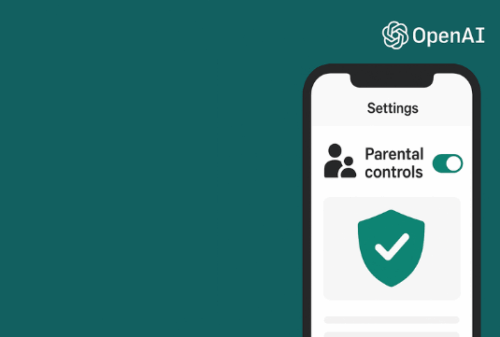
OpenAI Parental Controls for ChatGPT: A New Step for Teen Safety
OpenAI has launched parental controls to help families manage teen ChatGPT use safely. These controls OOpenAI has launched parental controls to help families manage teen ChatGPT use safely. These controls link parent and teen accounts, providing age-appropriate AI interactions. Additionally, OpenAI strengthened child safety measures to prevent abuse and exploitation.
Setting Up Parental Controls
Parents or guardians can send an invite to connect with their teen’s ChatGPT account. Teens can also invite a parent. Once linked, parents directly manage settings from their account. Furthermore, linked accounts automatically receive enhanced content protections.
Enhanced Safeguards for Teens
Teen accounts now receive extra protections against graphic violence, sexual, romantic, or violent roleplay, extreme beauty ideals, and viral challenges. Parents can adjust settings; however, teens cannot override them.
Customizing the Teen Experience
Parents can:
- Set quiet hours when ChatGPT is inaccessible.
- Disable voice mode for text-only interactions.
- Turn off memory so conversations do not save.
- Remove image generation.
- Opt out of model training to protect teen data.
These options remain flexible, allowing families to choose what works best for them.
Child Safety Policies
OpenAI strictly prohibits users from sexualizing children, grooming minors, exposing them to inappropriate content, or encouraging dangerous challenges. Users attempting CSAM or CSEM generation face reporting to NCMEC and immediate bans. Similarly, developers creating apps for minors must not allow sexually explicit content. OpenAI continuously monitors usage, bans violators, and prevents banned users from returning.
Responsible AI Training
OpenAI ensures training datasets remain free from CSAM and CSEM. Moreover, authorities receive immediate reports when abuse occurs. This proactive approach safeguards models from generating harmful content.
Detecting and Blocking Abuse
AI models actively avoid producing harmful outputs. OpenAI uses hash matching, CSAM classifiers, and industry collaboration to detect abuse. Consequently, accounts violating child safety policies face bans and are reported to NCMEC.
Novel Abuse Patterns
Some users attempt to upload CSAM or coerce models into sexual roleplay scenarios. OpenAI detects and blocks these attempts using classifiers, human expert review, and context-aware monitoring. Thus, the system addresses emerging abuse patterns effectively.
Safety Notifications
OpenAI systems alert parents if a teen may be at risk. Trained reviewers assess situations and notify parents while ensuring teen privacy. In extreme cases, emergency responders may also respond.
Advocating for Public Policy
OpenAI supports collaboration between government, industry, and advocacy groups to combat CSAM. For example, legislation like the Child Sexual Abuse Material Prevention Act promotes responsible reporting and proactive AI safeguards.
Resources for Parents
A parent resource page provides guidance on ChatGPT, parental controls, and safe AI use. Therefore, families can encourage learning, creativity, and responsible technology engagement.
Looking Ahead
OpenAI plans an age prediction system to automatically apply teen-appropriate settings. Until then, parental controls remain the most effective way to ensure safe AI experiences.
